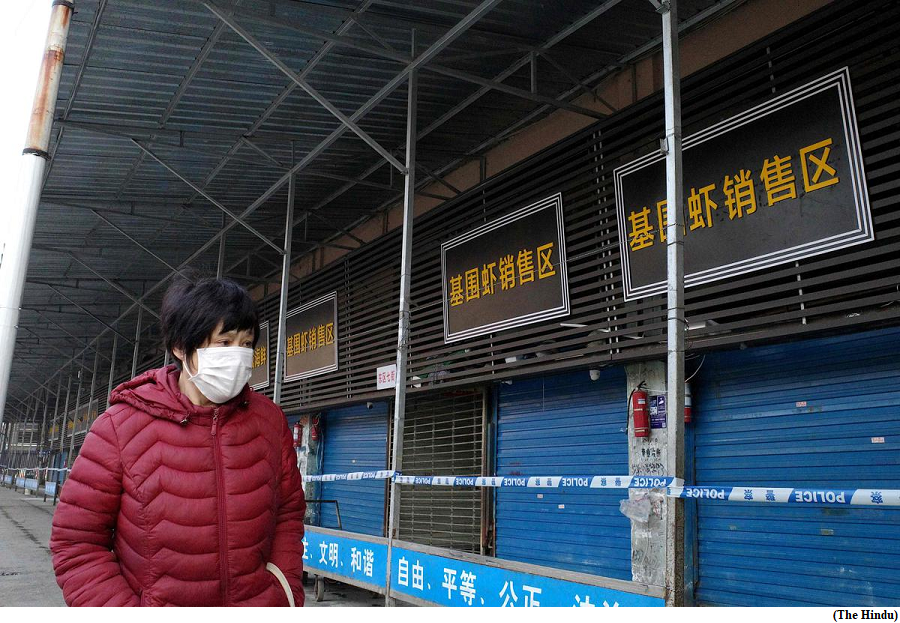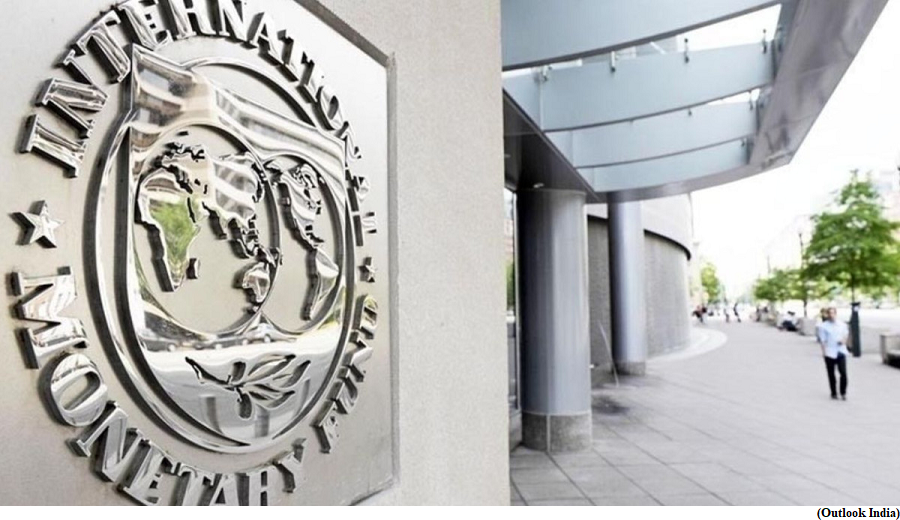A boost to the zoonoses theory (GS Paper 3, Science and Tech)

Why in news?
- In the never-ending debate about the origin of the virus that set off the COVID-19 pandemic, undisclosed genetic data from a food market in Wuhan has been unearthed and is being used to support the zoonoses theory over the lab leak theory.
- These findings were presented to the Scientific Advisory Group for the Origins of Novel Pathogens, an expert body constituted by the WHO.
What is this fresh theory about?
- Florence Débarre, who specialises in evolutionary biology at the Centre National de la Recherche Scientifique in France, discovered the data which consists of genetic sequences posted in GISAID, a virology database, by Chinese researchers.
- The Chinese team had reportedly collected samples from the Huanan Seafood Wholesale Market, which has been, since 2020 notoriously connected to a cluster of early COVID-19 cases.
- They had, in February 2022, posted a preprint with a graph that showed several environmental samples from the market containing the virus which also had human genetic material. It was this that Debarre had stumbled upon. It also reported that these sequences were later removed on the request of the authors.
- It goes on to document early published research from Gao and team that proposes that humans brought the virus to the market, having detected that some of the samples that tested positive for SARS-CoV-2 had human DNA, but none other.
- On the contrary, the evidence in front of the WHO now is that “some coronavirus-positive samples collected contained DNA or RNA from raccoon dogs, civets, and other mammals now known to be highly susceptible to SARS-CoV-2.”
Is it important to analyse origins?
- The main theoretical dualism that the world has contended with since the COVID-19 pandemic is the origin question, lab leak or zoonoses.
- Earlier, scientists urged the scientific world to keep an open mind about both the theories, on the ground that they remained viable. They also called upon public health agencies, and researchers to make their data and analyses open to the public.
Is this the final word on the origin question?
- Clearly, there will be many more pow wows in the future, most raucous on social media perhaps, as researchers on both sides of the dichotomous question endeavour to gather evidence to support their theory.
- This divisive debate will not die down; it is likely to continue until sufficient evidence emerges to arrive at a single cause.
- Critics of the animal transmission theory are demanding specifics and details on the ‘spill over’ while virologists say it would be impossible to get that level of data.
- With post facto research alone guiding the investigation, the scrutiny will likely continue.
IMF approves $3 billion in financial assistance for debt-ridden Sri Lanka
(GS Paper 2, International Organisation)
Why in news?
- Recently, the International Monetary Fund (IMF) has approved a USD 3 billion bailout programme to help debt-ridden Sri Lanka overcome its economic crisis and catalyse financial support from other development partners.

Details:
- International Monetary Fund's Executive Board approved a 48-month extended arrangement under its Extended Fund Facility (EFF) with an amount of SDR 2.286 billion (about USD 3 billion).
- Special Drawing Rights (SDR) are supplementary foreign exchange reserve assets defined and maintained by the International Monetary Fund (IMF).
Background:
- Earlier, Sri Lanka received IMF-compatible financing assurances from its official creditors, including Paris Club members, India and China, allowing the IMF to convene an Executive Board and consider Sri Lanka's request for a loan.
- The Paris Club is an informal group of official creditors whose role is to find coordinated and sustainable solutions to the payment difficulties experienced by debtor countries.
How it will help Sri Lanka?
- The EFF-supported programme aims to restore Sri Lanka's macroeconomic stability and debt sustainability, mitigate the economic impact on the poor and vulnerable, safeguard financial sector stability, and strengthen governance and growth potential.
- It will enable an immediate disbursement equivalent to SDR 254 million (about USD 333 million) and catalyse financial support from other development partners.
- The programme will allow Sri Lanka to access financing of up to USD 7 billion from the IMF, International Financial Institutions (IFIs) and multilateral organisations.
Economy of Sri Lanka:
- Sri Lanka has been hit hard by a catastrophic economic and humanitarian crisis.
- The economy is facing significant challenges stemming from pre-existing vulnerabilities and policy missteps in the lead-up to the crisis, further aggravated by a series of external shocks.
- Sri Lanka in April 2022 declared its first-ever debt default in its history as the worst economic crisis since independence from Britain in 1948 triggered by forex shortages sparked public protests.
- Months-long street protests led to the ouster of the then-president Gotabaya Rajapaksa in mid-July. Rajapaksa had started the IMF negotiations after refusing to tap the global lender for support.
- Sri Lanka has introduced painful economic measures such as tax hikes and utility rate hikes to unlock the programme. Trade unions and opposition groups have organised protests against such measures.



